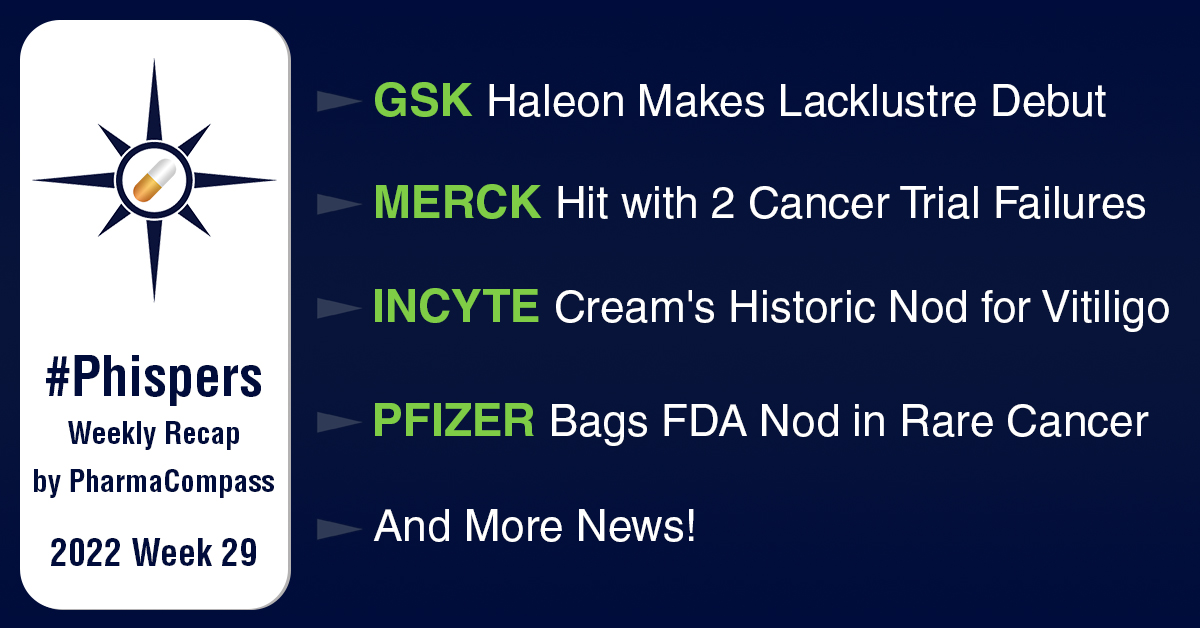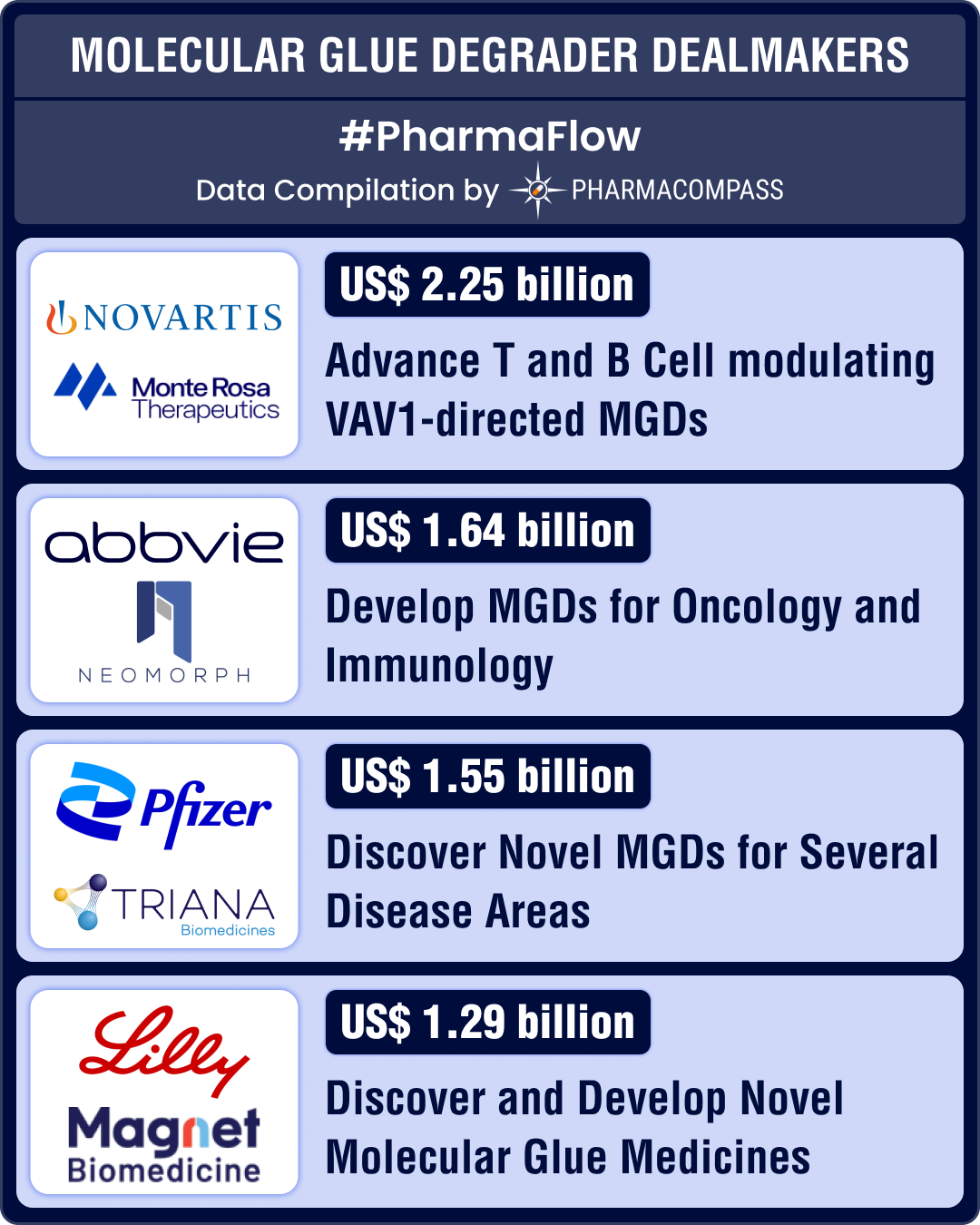
By PharmaCompass
2022-07-21
Impressions: 1,781
In this week’s Phispers, British pharma giant GSK spun off its consumer health unit — Haleon — in the biggest listing in Europe in over a decade. Haleon had a rocky start as its market valuation tanked by almost US$ 3 billion on the first day.
In FDA approvals, Pfizer’s kinase inhibitor Xalkori has received the agency’s nod to treat unresectable, recurrent or refractory inflammatory ALK-positive myofibroblastic tumors. The FDA has also approved Incyte’s JAK inhibitor Opzelura (ruxolitinib) cream for the treatment of non-segmental vitiligo in patients 12 years and above. Opzelura is the first repigmentation cream for vitiligo.
Merck and AstraZeneca have decided to end a phase 3 trial evaluating their blockbuster cancer drug Lynparza as a treatment for colorectal cancer. The trial compared Lynparza as a monotherapy and as a combination therapy with Avastin (bevacizumab) to Avastin plus chemotherapy, but failed to show results.
Meanwhile, Merck’s blockbuster cancer therapy Keytruda has failed in a late-stage study in patients with head and neck cancer. And Japan-based drugmaker Kyowa Kirin said it has decided to discontinue development of its Parkinson’s disease candidate — KW-6356 — due to seemingly formidable development and regulatory hurdles.
Novartis has said it is shelving tislelizumab’s US submission as a monotherapy for non-small cell lung cancer (NSCLC). And Eisai is shutting down its oncology subsidiary – H3 Biomedicine. According to reports, the shutdown will result in the loss of at least 88 jobs.
With Novavax’s Covid-19 vaccine Nuvaxovid receiving the US Food and Drug Administration’s emergency use authorization, Indian vaccine maker Serum Institute of India (SII) has received a go-ahead to supply the shot to the US.
Pittsburgh-based Avista Therapeutics has entered into a partnership with Roche to develop AAV gene therapy vectors for eye diseases. Samsung Biologics is setting up a second campus in South Korea, and WuXi Biologics said it will invest US$ 1.4 billion over a 10-year period in Singapore.
GSK’s consumer health unit Haleon makes lacklustre debut on London exchange
In the biggest listing in Europe in over a decade, British pharma giant GSK spun off its consumer health unit Haleon this week. With the listing, Haleon – home to brands such as Sensodyne toothpaste and Advil painkillers – has become the world’s largest consumer health company.
Haleon shares started trading on Monday with a market capitalization of about £31 billion (US$ 37 billion), but its valuation fell to £28.5 billion (US$ 34 billion) by the end of the day. It listed among the top 20 companies by market cap in London’s FTSE index.
While analysts said Haleon’s debut price is in line with what the market had expected, its valuation fell way short of the price that Unilever had offered to pay. In January, GSK had rejected a £50 billion (US$ 59.75 billion) offer from Unilever, saying it had “fundamentally undervalued” the business and its future prospects.
Haleon, which made £9.6 billion (US$ 11.47 billion) last year, is forecast to bring in £10.7 billion (US$ 12.8 billion) in 2022, according to Barclays analysts.
Following its consumer health unit’s spin off, GSK plans to focus solely on developing new drugs and vaccines. Pfizer, which has a 32 percent stake in Haleon, has also said it plans to sell its stake over time in the consumer health company.
Pfizer’s Xalkori gets FDA nod to treat rare ALK-positive tumors
Pfizer’s kinase inhibitor Xalkori has received FDA’s nod to treat unresectable, recurrent or refractory inflammatory ALK-positive myofibroblastic tumors. The approval is for patients with tumors that can’t be removed by surgery and are progressing even after prior treatment.
The approval is based on the positive outcome of a 21-patient study in pediatric and adult patients. Of the 14 pediatric patients, 12 reported tumor shrinkages. Five of the seven adults also reported similar results.
This is the second nod for Xalkori in as many years. Around 18 months ago, the drug was approved to treat a rare form of non-Hodgkin lymphoma – relapsed or refractory anaplastic large cell lymphoma (ALCL) that is ALK-positive.
Last year, Xalkori brought in US$ 493 million in revenue – a drop of 9 percent from the US$ 544 million the drug had earned in 2020. Pfizer’s Lobrena and Takeda’s Alunbrig are already approved in the market for the same indication.
Incyte’s Opzelura cream wins ‘historic’ FDA nod to treat vitiligo
FDA has approved Incyte’s JAK inhibitor Opzelura (ruxolitinib) cream for the treatment of non-segmental vitiligo in patients 12 years and above.
With the approval, Opzelura has become the first repigmentation cream and the first alternative to steroid drugs for vitiligo, a chronic autoimmune disease that causes depigmentation of the skin from the loss of pigment-generating cells known as melanocytes. The disease affects over 1.5 million people in the US.
The approval for the drug comes following positive results from two phase 3 trials that enrolled around 600 patients over the age of 12 years. After 24 weeks, almost one third of the patients showed at least 75 percent improvement in their vitiligo area score compared to eight to 13 percent for patients on a placebo. After one year, about half the patients showed the same results.
Opzelura was first approved in mild to moderate atopic dermatitis in September last year. The drug is a cream version of ruxolitinib, which was first approved as an oral treatment in 2011.
Merck, Astra to halt trial after Lynparza fails in late-stage colorectal cancer study
Merck and AstraZeneca have decided to end a phase 3 trial evaluating their blockbuster cancer drug Lynparza as a treatment for colorectal cancer.
The phase 3 trial was evaluating Lynparza in patients with unresectable or metastatic colorectal cancer who had not progressed after a first-line induction treatment. The trial compared Lynparza as a monotherapy and as a combination therapy with Avastin (bevacizumab) to Avastin plus chemotherapy. However, an independent data monitoring panel during an interim analysis found that both the regimens failed to improve upon Avastin’s combination with chemotherapy to stall tumor progression or death.
Merck and AstraZeneca said they will share full data at an upcoming medical conference. Since Lynparza’s first approval for breast cancer in 2014, the PARP inhibitor has been approved in eight different tumor types. The drug has become one of the fastest-growing cancer drugs in the market, generating US$ 2.75 billion in sales last year.
Keytruda fails in late-stage trial for head, neck cancer: Merck’s blockbuster cancer therapy Keytruda has failed to meet its main goal in a phase 3 study in patients with head and neck cancer. The pharma was testing Keytruda in combination with chemo-radiation therapy. While the combination showed improvement in event-free survival – the period of time a patient remains free of complications compared to a placebo – the results did not meet statistical significance.
Eisai to shutter its oncology subsidiary; to lay off over 80 staff
Japanese pharma Eisai is shutting down its oncology subsidiary – H3 Biomedicine. A report published in The Boston Business Journal said the shutdown will result in the loss of at least 88 jobs. According to a WARN (Worker Adjustment and Retraining Notification) notice filed with the state, up to 79 employees will be laid off by September 15.
The decision is part of a larger reorganization being undertaken by Eisai. The cancer unit’s work will now be undertaken by the Deep Human Biology Learning department of Eisai. In more than a decade of its existence, H3 Biomedicine has filed four Investigational New Drug (IND) applications with the FDA and forged two licensing deals, including one with Bristol Myers Squibb that harnesses H3’s RNA splicing platform. The Japanese pharma said the work of the venture is “complete.”
Eisai’s long-time Alzheimer’s partner Biogen has also laid off around 300 people in recent months, after it announced plans to streamline its operations in order to save up to US$ 1 billion.
Biogen pays US$ 900 million to resolve whistleblower lawsuit: Biogen has agreed to pay around US$ 900 million to resolve a whistleblower lawsuit dating back to 2015 that accuses Biogen of paying kickbacks to doctors for prescribing its multiple sclerosis drugs – Tecfidera, Tysabri and Avonex.
Novartis scraps cancer drug submission after FDA highlights inadequate trial data
Last week, the FDA had deferred action on Novartis and its Chinese partner BeiGene’s biologics license application (BLA) for tislelizumab in previously treated esophageal squamous cell carcinoma (ESCC) citing Covid-related travel restrictions. This week, the Swiss pharma said it is shelving the drug’s US submission as a monotherapy for non-small cell lung cancer (NSCLC).
The company said it decided to scrap the monotherapy filing in newly diagnosed NSCLC after the FDA said the trial “didn’t adequately reflect the US population in terms of the number of patients and the standard of care.”
Novartis will now focus on finishing the filing in previously treated ESCC as well as a potential filing in first-line esophageal cancer.
Kyowa Kirin halts development of Parkinson’s med despite promising data
Japan-based drugmaker Kyowa Kirin said it has decided to discontinue development of its Parkinson’s disease candidate KW-6356, despite the drug showing promise. The Japanese drugmaker said phase 2 data for the drug showed it has promise either as a monotherapy or as a combo therapy to treat Parkinson’s disease. But it decided to suspend the program because the potential development and regulatory hurdles seem to be too formidable.
The drug, KW-6356, is a follow-up to Kyowa Kirin’s first-generation adenosine A2 antagonist Nourianz/Nouriast (istradefylline), which was approved by the FDA in 2019 as an add-on to Levodopa in Parkinson’s.
India’s Serum Institute to supply Novavax’s Covid-19 vaccine to US
With the FDA’s emergency use authorization for Novavax’s Covid-19 vaccine — Nuvaxovid — Indian vaccine maker Serum Institute of India (SII) has received a go-ahead to supply the shot to the US. SII has become the first Indian vaccine maker to produce a Covid vaccine for the US market.
All of Novavax’s Covid vaccines are manufactured by SII at its facility in Pune, India. Nuvaxovid is already available in highly regulated markets such as Europe and Australia. The US government has bought 3.2 million doses of the Novavax shot following a positive recommendation from an FDA expert panel. The shots are expected to be rolled out by the end of the month.
Europe to buy 2.25 million vials of Gilead’s Covid drug: The European Commission has signed a deal to buy up to 2.25 million vials of Gilead’s antiviral Covid-19 treatment, Veklury. Around 22 member states are participating in the joint procurement deal. This is the second contract for the drug, which is approved in Europe to treat Covid patients who are at high risk of experiencing severe disease, along with patients who have pneumonia and require supplemental oxygen.
Roche inks potential US$ 1 billion deal with Avista Therapeutics for eye diseases
Pittsburgh-based Avista Therapeutics has entered into a partnership with Roche to develop AAV gene therapy vectors for eye diseases. The partners will use Avista’s single-cell adeno-associated virus (AAV) engineering platform, scAAVengr, to develop intravitreal AAV capsids.
Under the terms of the deal, Roche will pay Avista US$ 7.5 million upfront. Additionally, Avista will be eligible for milestone payments and will receive royalties for any commercial products that come out of the partnership. Overall, the partnership agreement has a potential deal value greater than US$ 1 billion.
Samsung Biologics to set up second campus in South Korea
The contract development and manufacturing (CDMO) arm of Samsung – Samsung Biologics – has purchased 3.8 million square feet in the Incheon Free Economic Zone for US$ 324 million to build its second campus. The land is 30 percent larger than the company’s current campus and is adjacent to its current 60-acre campus in Songdo, South Korea. Dubbed Bio Campus II, it is designed to support further expansion of large-scale manufacturing capacity along with a plant and an innovation facility. The company is planning to add a total of 4,000 jobs added by 2032.
WuXi Biologics to invest US$ 1.4 billion in Singapore: Chinese CDMO WuXi Biologics will invest US$ 1.4 billion over a 10-year period in Singapore to establish a research and development service center and large-scale drug substance and drug product manufacturing facilities. The new site will employ around 1,500 staff in research, development and manufacturing roles.
The PharmaCompass Newsletter – Sign Up, Stay Ahead
Feedback, help us to improve. Click here
Image Credit : Phisper Infographic by SCORR MARKETING & PharmaCompass is licensed under CC BY 2.0
“ The article is based on the information available in public and which the author believes to be true. The author is not disseminating any information, which the author believes or knows, is confidential or in conflict with the privacy of any person. The views expressed or information supplied through this article is mere opinion and observation of the author. The author does not intend to defame, insult or, cause loss or damage to anyone, in any manner, through this article.”








